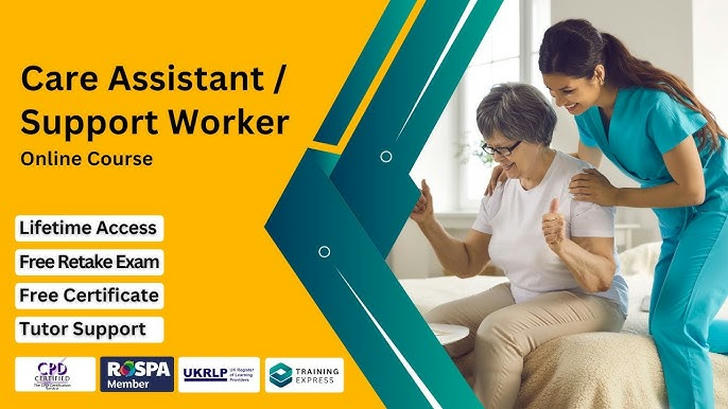Free Support Worker Training in the U.S.: Programs and Organizations That Can Help You Start a Career
Support workers, including personal care aides and home health aides, play a critical role in assisting those with daily living tasks, particularly elderly and disabled individuals. For those interested in joining this fulfilling field, many organizations across the United States offer free or subsidized training options to help you gain the necessary skills and certifications. Below are some of the most widely available programs and resources.

1. Job Corps: Free Training for Young Adults
Job Corps offers free vocational training for individuals aged 16-24, including programs for support worker roles such as Certified Nursing Assistants (CNAs) and personal care aides. This federally funded program covers tuition, housing, and meals, allowing students to focus on completing their training without financial stress. Job Corps centers across the country offer relevant healthcare certifications that can launch a career in support services.
How to Apply: Visit the Job Corps website or contact your local Job Corps center to learn more about eligibility requirements and application steps.
2. Workforce Innovation and Opportunity Act (WIOA)
The Workforce Innovation and Opportunity Act (WIOA) is a federal program that helps adults, including low-income individuals and displaced workers, access training for in-demand jobs. Support worker positions are typically eligible for WIOA funding, which can cover the full cost of training. WIOA funds are distributed through local American Job Centers, where applicants can find eligible programs for personal care aides and other support roles.
How to Apply: Connect with your nearest American Job Center to explore WIOA-approved training programs and eligibility criteria.
3. State Medicaid Programs and Long-Term Care Facilities
Some state Medicaid programs and long-term care facilities offer free or reduced-cost training for support workers as part of their workforce development initiatives. These programs are often geared towards individuals seeking careers in caregiving, including positions like home health aides and personal care assistants. Facilities offering this training may also offer employment post-certification, creating a clear pathway from training to employment.
Example:
New York State Department of Health: Offers a Home Care Aide Training Program for Medicaid-funded home care positions.
Minnesota: Provides support worker training through its long-term care facilities in partnership with state grants.
How to Apply: Visit your state’s Department of Health website or contact local long-term care facilities to inquire about available programs.
4. Goodwill Industries
Goodwill Industries partners with community colleges and healthcare organizations to provide training programs, including those for support worker roles. While training varies by location, Goodwill offers both entry-level and advanced courses for individuals interested in health-related careers. Programs may include hands-on training and certification prep, as well as employment placement assistance upon completion.
How to Apply: Check with your local Goodwill chapter for available support worker programs and application requirements. Find local Goodwill locations through the Goodwill website.
5. Nonprofit Organizations and Community Health Programs
Many nonprofit organizations provide training for support roles at little or no cost, often focusing on underserved communities. These programs may include courses for caregiving, home health assistance, and patient support. Nonprofits such as Catholic Charities and United Way have collaborated with healthcare facilities to offer affordable training programs.
Example:
Catholic Charities: Some branches offer training for home health aides, especially for those who are low-income or face employment barriers.
United Way: Provides healthcare support training initiatives in certain locations.
How to Apply: Search for nonprofit organizations in your area, or visit websites like Catholic Charities or United Way to learn more about local support worker training programs.
6. Healthcare Employers Offering Paid Training Programs
Certain healthcare employers, such as nursing homes, hospitals, and home care agencies, offer paid training programs for support workers. These programs often pay for the cost of training and certification and may also offer stipends or hourly pay during training. In exchange, participants are usually required to work for the employer for a specified period after completing the program.
Example:
Brookdale Senior Living: Partners with agencies to train personal care aides and home health aides.
PCA Healthcare: Provides paid training programs across multiple states, with a commitment to hire trainees post-certification.
How to Apply: Contact local healthcare facilities or visit their websites to find out about any paid training opportunities they may offer. Job listings on company websites often include information about training programs and how to apply.
7. Veterans Affairs (VA) and Programs for Military Families
Veterans and military spouses can access free training for support roles through various programs supported by the Department of Veterans Affairs (VA) and military-friendly organizations. Programs like My Career Advancement Account (MyCAA) offer financial support for military spouses to pursue healthcare certifications, including support worker training.
How to Apply: Veterans should contact the VA to explore their eligibility, while military spouses can find out more through the MyCAA program on the Military OneSource website.
Conclusion: Take the Next Step Toward Your Support Worker Career
The field of support work offers abundant opportunities, and with the resources provided by federal programs, nonprofit organizations, and employers, anyone interested can pursue this fulfilling career without financial burden. By taking advantage of the free or subsidized training options, you can enter the workforce prepared and ready to make a positive impact on individuals' lives.
Start by researching available programs in your area, apply for training through Job Corps or WIOA if you’re eligible, and look into local nonprofits and healthcare employers. Your journey to a rewarding support worker career is within reach!
